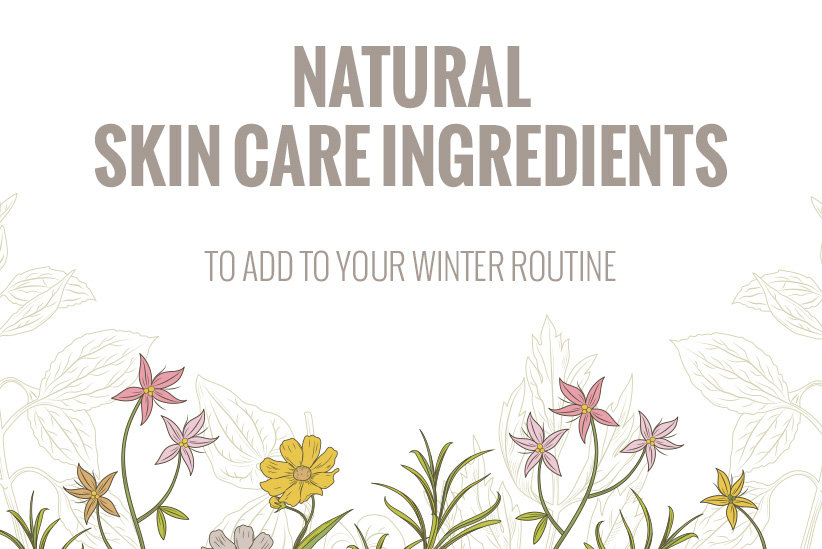Winter is here, and sadly, so is dehydrated and dull skin.
This is especially common in the colder months, when the humidity level drops, and the water content of our epidermis (the outer layer of the skin) tends to reflect this.
Did you know that your skin loses more than 25% of its ability to hold moisture during the colder season?
Fortunately, there are simple and inexpensive things you can do to relieve the dry skin that comes with winter. Below, we’ve listed a few natural skin care ingredients to incorporate into your routine this winter (or to look out for in products)!
Petrolatum and Shea Butter
- These ingredients help prevent the skin from losing moisture in the cold weather.
- Using petrolatum and shea butter together works well and offers the skin both protection from the dry environment, as well as the healing benefits of terpenes.
- Adding the ingredients works the best when they’re left on the skin in the form of a moisturizer and not washed off.
- If you happen to be prone to acne or clogged pores, it’s best to use these products sparingly on your face.

Avocado Oil

- Armed with vitamin E (as well as omega-3 fatty acids), this oil is known for its soothing and regenerative properties and is very well absorbed by the skin. Studies have also shown that avocado oil also promotes collagen generation, while also reduces inflammatory cells during the wound healing process.
- The fats, compounds, and vitamins that are found in avocado can help improve skin conditions like acne and eczema.
- The anti-inflammatory agents, and the antioxidants in avocado oil, play a part in helping our skin stay smooth, strong and elastic.
- This product won’t work as well for people with oily skin, as it will leave some grease behind. It’s best recommended for those with dry skin.
Jojoba Oil
- Jojoba is lighter than other types of face oils and is easily absorbed into our skin. Unlike water-based moisturizers, it doesn’t evaporate, which is very important when your skin is exposed to the winter weather. It’s also full of nutrients like Vitamin B and E, and minerals and antioxidants like copper, chromium, and zinc, all of which protect and nourish the skin.
- It doesn’t clog your pores, or make your skin greasy! Because jojoba oil is relatively similar to the oil that our skin produces, it tricks our skin into believing that it’s produced enough oil. Our oil production balances, without promoting skin problems like acne.
- Recommended for people with sensitive skin, including those with eczema and psoriasis, as it’s very gentle.
- Has anti-inflammatory properties that reduce redness that’s caused by drying, and eases the effects of rosacea and eczema.
Vitamin C
- Vitamin C is known as one of the best anti-ageing ingredients, and key to maintaining an even and smooth complexion. Although the majority of us are probably getting enough Vitamin C in our diet, there is no way to guarantee that it’s going straight to our skin. A main vitamin C derivative, magnesium ascorbyl phosphate, has been shown to hydrate our skin. Decreasing trans epidermal water loss, it helps our skin retain it’s moisture.
- The best way to reap the benefits of vitamin C for our skin is through serums and topical products.
- It gives the skin a youthful glow.

Argan Oil
- This oil is particularly good for people with dry skin, making this ingredient a must for your winter skin care routine. Compared to heavier oils (such as olive oil and coconut oil), argan oil has smaller molecules and therefore can penetrate the skin easier. It delivers moisturizing, anti-ageing, and healing benefits.
- Argan oil is most commonly used as a moisturizer, and is found in many hair products, lotions, and soap.
- Has an abundance of vitamin E (a fat-soluble antioxidant, that can help our skin retain moisture).
Safflower Oil

- Used as a topical moisturizer, the linoleic acid in the safflower oil is thought to help prevent your skin from flaking.
- Creats a moisture barrier on your skin.
- This is an essential fatty acid that offers a variety of skin benefits, and can be more budget-friendly than other skin care products.
- Apply this oil to your eczema only once or twice per day. Safflower oil lubricates the skin and creates a barrier that prevents water from leaving your skin, helping to lock in moisture.
- Improves both the texture and tone of your skin.




